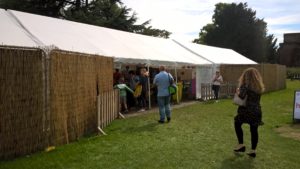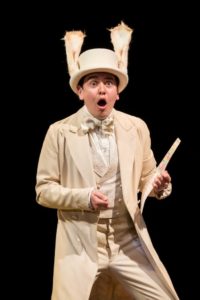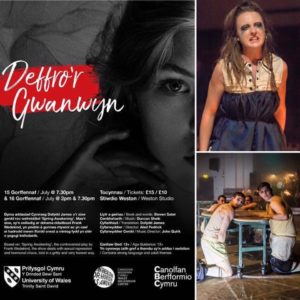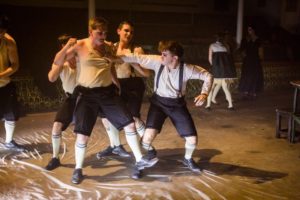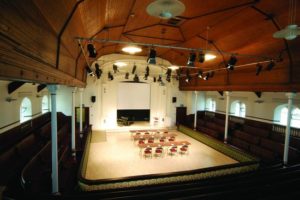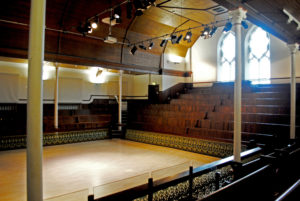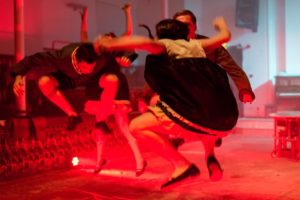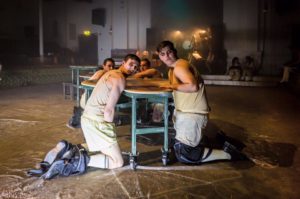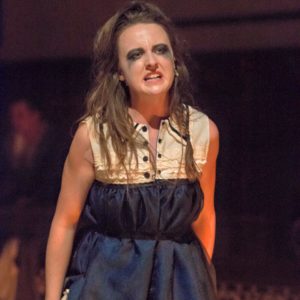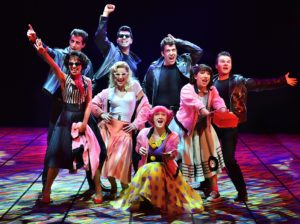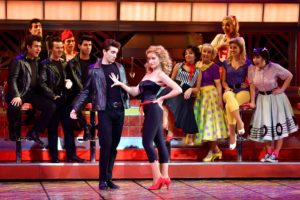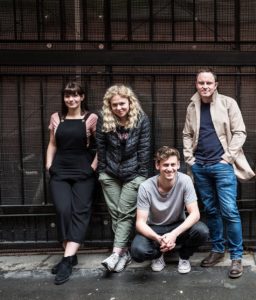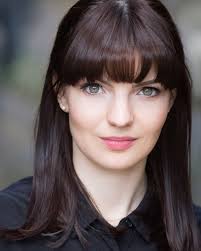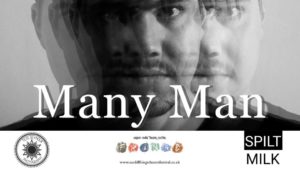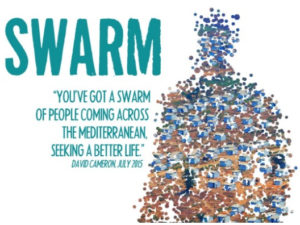
 (5 / 5)
(5 / 5)
I don’t know about you but usually the mention of ‘immersive theatre’ brings about a slight sense of unease and dread. It’s a bit like when your team leader at work says there’s going to be a role playing exercise for the team.
I am also still slightly annoyed/scarred about the Antonin Artaud-style absurdist ‘theatre of cruelty’ workshop I was once subjected to at University. In that, audience members were herded into a room, plunged into darkness, doused with cold water and played a disturbing series of images projected onto a wall with a screechy soundtrack. I have distrusted and shied away from ‘immersive theatre’ ever since (and realised at that very point that I am definitely not a true thespian and should probably just leave it to the professionals).
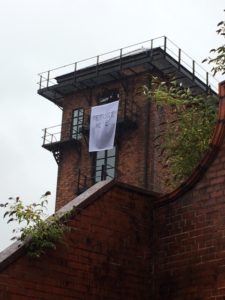
A sign saying Refuge Here
However, when a topical play by a theatre company nominated by the Kevin Spacey Foundation as the Artist of Choice in 2016 puts on a play in your back garden (or down the hill from your house!), it would be really absurd not to get excited about it. Especially when this company’s last play ‘The Mountaintop’, about Dr Martin Luther King’s last night on earth, gave you goosebumps, sweats and bellyflips galore. This is a production company that knows exactly how to push your buttons and manipulate your emotions (and have you thanking them for it afterwards).
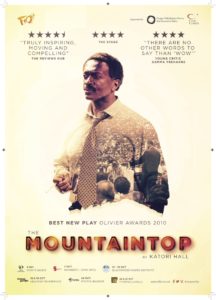
Local collaboration
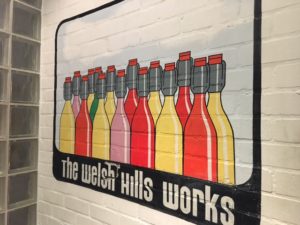
Pop Bottle Mural in the Pop Factory, Porch
‘Swarm’ picks up on comments made by former Prime Minister David Cameron in July 2015: “You’ve got a swarm of people coming across the Mediterranean, seeking a better life”.
Director Abdul Shayek unpicks this throwaway comment, holding a mirror up to society’s deep-rooted fear, misunderstanding and sheer distrust of refugees. He pulls the audience into the world of the refugee so they can experience first hand what it’s like to run and fear for your life, leaving everything and everyone you have ever known.
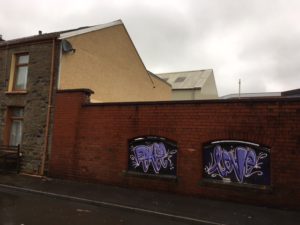
Jenkin Street in Porth
Following the success of the original show staged in Cardiff, where Production company Fio collaborated with members of Butetown football team (Tiger Bay FC), the show’s popularity struck a cord with audiences and the company received funding to work with more arts companies and local communities including Cwmbran and Merthyr.
The Pop Factory show in Porth was supported by ArtWorks/Valleys Kids and children and young people from the local community. The production includes multiple community cast members – most of them children, mixed in with professional actors. The concept of the play is that Wales is at Civil War and you – a refugee – are trying to gain admission to a camp as war rages around you and closes in. Interspersed with the drama and chaos of camp life are alarms and sirens, sounds of bombing and news clips where vox pops of the British publish spill their worries, concerns and venom towards refugees.
Life inside a refugee camp
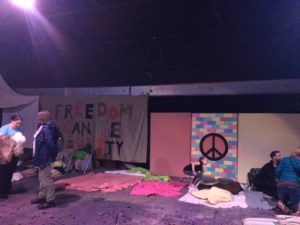
‘Swarm’ at The Pop Factory
At first, audience members are ‘processed’ in a holding facility, before being ushered into a safe zone. You are marshalled into lines and examined medically for signs of illness before being taken to camp. Once in ‘camp’, you come face to face with children already sleeping and living at the camp.
The Doctors and volunteers split you into groups. You are taken through the emergency drill (an air raid-like siren frequently sounds – and you are to drop to your knees in silence as you are instructed), you fill in a form about your intended destination, a photograph is taken of you, you are shown how to wash your hands and given a toothbrush.
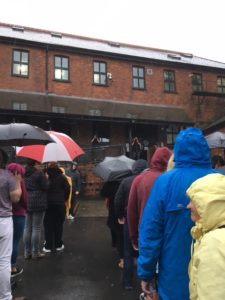
Processing the refugees…
All around you, there are all the visible, breathable remnants and signs of human life and cohabitation – a line of drying clothes, makeshift beds strewn across the floor, a central mat for children to draw and play cards.
There are ‘missing people’ signs everywhere. An exasperated, traumatised actor ‘Kaz’ is frantically looking for his daughter. As you mill around, you are approached by actors: “Are you alone? I hope you are safe here…you ought to be safe but….please be careful.” Children ask you “Do you need help? Do you want to write a message on the wall?” One little boy tells me he hasn’t seen his Mam and Dad for four and a half months. My eyes prick with tears despite myself. I am in Porth inside an old Pop Factory I could see from my Grandmother’s old garden in Glynfach. Yet in that moment I am in a refugee camp, stunned and shocked and appalled at my own privilege ‘in real life’.
Eyeball to eyeball with child refugees
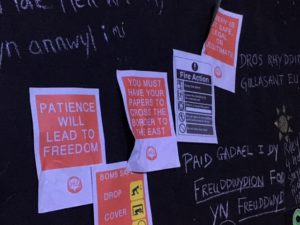
Signs in the Refugee Camp
It is cramped, it is uncomfortable and you don’t know where to look because as in life – when you are face to face with awkward, ugly situations you look at the floor. Or the children. Just focus on the children, because despite everything, they endure, they go on, they play. Anything else in the room was just too much to take in. In the midst of sirens, potential raids, tempers flaring, actors crying – the children drew pictures and played cards with audience members and laughed. Their innocence is entirely disarming and exposing.
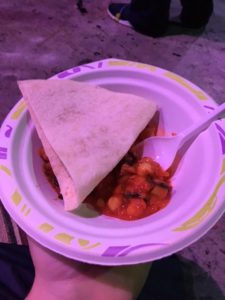
Camp food from Refugee Camp volunteers…
At one point the camp volunteers gave out bowls of food. There wasn’t enough for everyone, they said. You can only eat if you have been processed. One of the children (from the community cast) sidled up to me, watching me as I debated whether or not we were supposed to eat the food. “I haven’t actually eaten today…” she said confidently. One of the other kids, who sensed she was going off script nudged her and said ‘Shhhh, we aren’t supposed to actually take the food from them…!” “Take it!” I said. The other kids looked around to check for reactions from the theatre staff and watched her wide eyed. “I won’t tell anyone..” I winked. I sat there momentarily mesmerized by a kid playing a role of a refugee and still slightly unsure of my own role in the scene.
I was given a blanket by a volunteer who told me she’d lost contact with her brother – a rebel fighter – and clothes if I wanted them. I was given a toothbrush and I read the messages on the wall over and over. Towards the end, one of the actors ‘Kaz’ is faced with the choice of staying in the camp with his sick son or leaving the camp to search for his daughter 5 hours away. We don’t get to find out if they were reunited. What would you do? How would you react? The whole experience from start to finish – away from the tradition and comfort of proscenium arches and plush theatre seats – begs this question and drags the audience into the story.
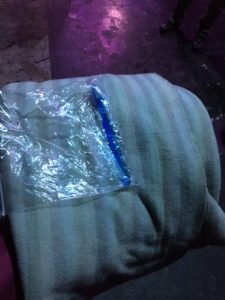
Blanket and toothbrush given to me at the Refugee Camp
Theatre without the frills
Although it’s been 15 years since the ridiculous ‘theatre of cruelty’ workshop I went to, it turns out that far from plunging the audience into a nightmarish, annoying episode they’d rather forget – Artaud’s actual intentions were that theatre should ‘wake us up – nerves and heart’. And Fio certainly does that.
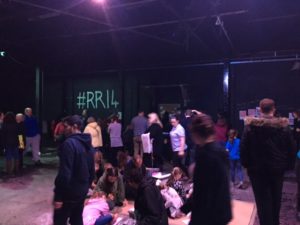
New Refugees waiting to be processed…
The great theatre practitioner Bertolt Brecht advocated stripping away the distractions of traditional theatre and exposing the realities of the human condition. For him, theatre was a forum for political debate. There is plenty to draw upon in this production and Fio challenges the audience from start to finish, adding context and authenticity to the refugee debate via its strong cast and convincing staging.
Speaking to Director Abdul Shayek after the show, I asked him what dimension he thought the kids brought to the show.
“People empathise with children a lot more…if you had a cast of adults, it would have been a different show, we would have lost a lot of the innocence. And actually when you talk about war and the refugee crisis…it’s the young people who will suffer. They are the future. They are a metaphor in a sense. They are the future and the future is being messed up. Young people have the same dreams and aspirations and they want the same basic things in life, whether they live here or in Syria or Iraq. They want to play, be safe and be fed – they want love and care…’
No matter what your political persuasion or views on the subject, it is surely utterly impossible to turn away from a child. So when some of the individual stories from the refugees were being relayed and the children milled around, they stopped dead in front of audience members and did nothing but look at them – directly into their eyes. Saying nothing. Because really at that point there is almost nothing left to say. Your instinct is to help and to comfort and to forget your own motivations and ‘entitlements’.
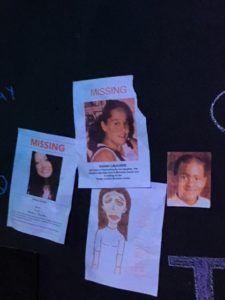
Missing people at the Refugee Camp…
Away from angry mobs and nasty online comment threads and peacocking politicians and boozy pub bravado and scarcity mindset and privilege hoarders who don’t want to share, can you look a child in the eye and tell them their life means less and your opportunity and wealth means more?
This is a production that will heighten your senses and open your eyes to what it really means to be a refugee. Superb.
https://www.wearefio.co.uk
Type of show: Theatre
Title: Swarm
Venue: The Pop Factory
Date: 28th July 2017
Directed by: Abdul Shayek
Produced by: Fio Productions, ArtWorks Valleys Kids and The Pop Factory
 (4 / 5)
(4 / 5)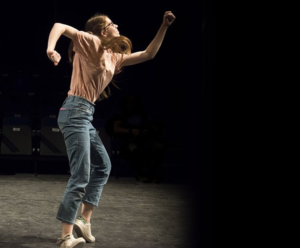

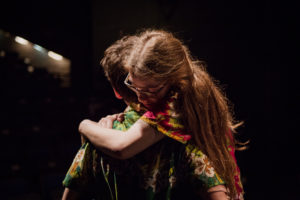
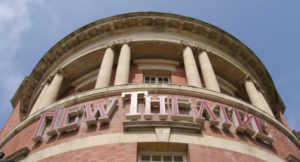
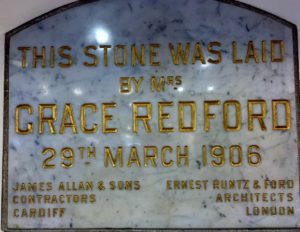
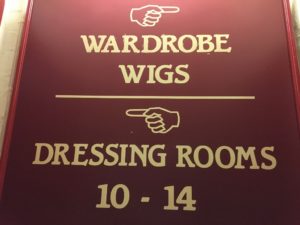
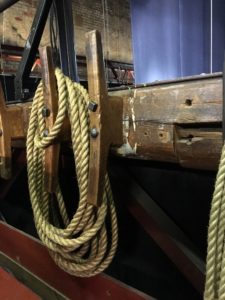
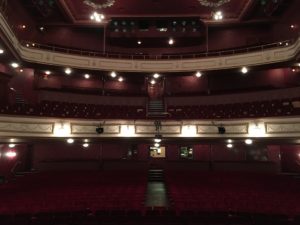
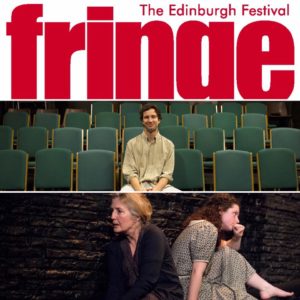
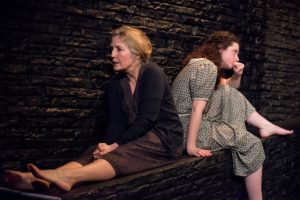

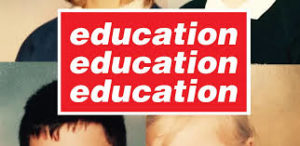
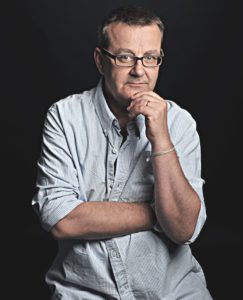
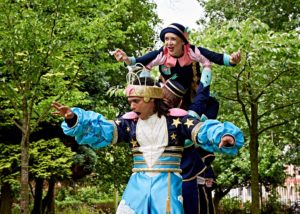
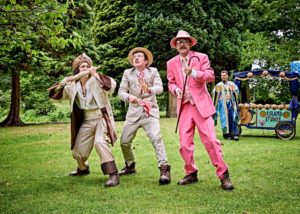
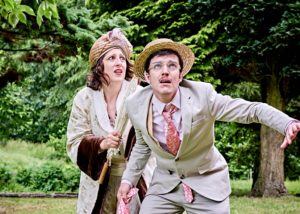
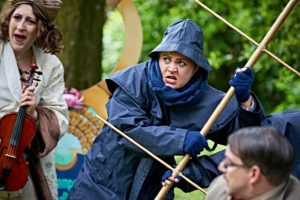
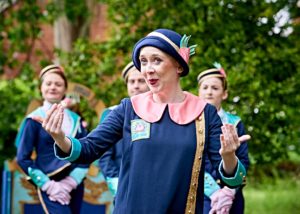
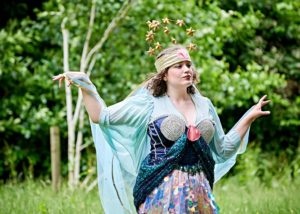
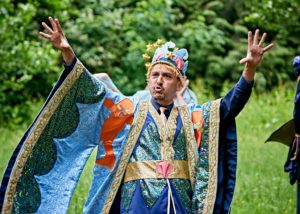

 (5 / 5)
(5 / 5)










